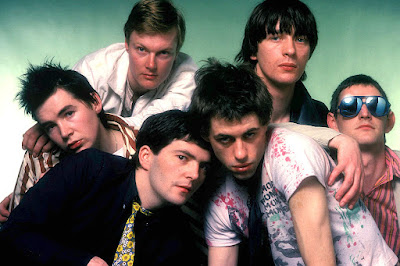 |
| The sensibility was always complicated. |
Pretty sure this one never fully checked out of the Western zeitgeist, but you tell me.
The Hit
For whatever reason the aside, “Good heavens, Miss Sakamoto, you’re beautiful” remains one of my main memories of Thomas Dolby’s, “She Blinded Me with Science.” As people of a certain age know, that song was all over the place in the early 1980s (circa 1982), so I always thought of Dolby as a big star. He did better in the UK – and wasn’t too shabby on U.S. album sales at his peak – but that single was his only U.S. hit. It topped out a No. 5...but, swear to God, MTV had that on whatever’s denser than heavy rotation for a solid year.
Here's where I admit I didn’t mind it. It’s nicely busy, the tones perky, the rhythm bouncy and kind of fun; better, the whole thing feels a bit campy. And, if you ever thought Dolby came up with the video/concept before the song...ding, ding ding!
“Yeah, I came up with a storyboard for a video. I'd recently seen a Japanese magazine awarding a Young Scientist of the Year in 1981. I took that as kind of amusing. If I was going to be a scientist, I'd need a hot Japanese lab assistant and I'd need a cool vintage motorcycle hat, kind of an homage to deranged scientists. I phoned up this famous TV scientist for the BBC, Dr. Magnus Pike [to appear in the video]."
"The record execs liked the idea of the video, but said, ‘Where's the song?’ I said, ‘Oh, how about I bring it in on Monday morning?’ and went home over the weekend and did the first bit of the song.”
Fuck it. It’s fun. Moreover, it prefaced things to come in Thomas Dolby’s career.
The Rest of the Story
“I'm not a very proficient keyboard player, so the computer became my musical instrument ... None of the equipment is essential, though. In a way, I was happier when I just had one monophonic synthesizer and a two-track tape deck.”
- Wikipedia
The Hit
For whatever reason the aside, “Good heavens, Miss Sakamoto, you’re beautiful” remains one of my main memories of Thomas Dolby’s, “She Blinded Me with Science.” As people of a certain age know, that song was all over the place in the early 1980s (circa 1982), so I always thought of Dolby as a big star. He did better in the UK – and wasn’t too shabby on U.S. album sales at his peak – but that single was his only U.S. hit. It topped out a No. 5...but, swear to God, MTV had that on whatever’s denser than heavy rotation for a solid year.
Here's where I admit I didn’t mind it. It’s nicely busy, the tones perky, the rhythm bouncy and kind of fun; better, the whole thing feels a bit campy. And, if you ever thought Dolby came up with the video/concept before the song...ding, ding ding!
“Yeah, I came up with a storyboard for a video. I'd recently seen a Japanese magazine awarding a Young Scientist of the Year in 1981. I took that as kind of amusing. If I was going to be a scientist, I'd need a hot Japanese lab assistant and I'd need a cool vintage motorcycle hat, kind of an homage to deranged scientists. I phoned up this famous TV scientist for the BBC, Dr. Magnus Pike [to appear in the video]."
"The record execs liked the idea of the video, but said, ‘Where's the song?’ I said, ‘Oh, how about I bring it in on Monday morning?’ and went home over the weekend and did the first bit of the song.”
Fuck it. It’s fun. Moreover, it prefaced things to come in Thomas Dolby’s career.
The Rest of the Story
“I'm not a very proficient keyboard player, so the computer became my musical instrument ... None of the equipment is essential, though. In a way, I was happier when I just had one monophonic synthesizer and a two-track tape deck.”
- Wikipedia



